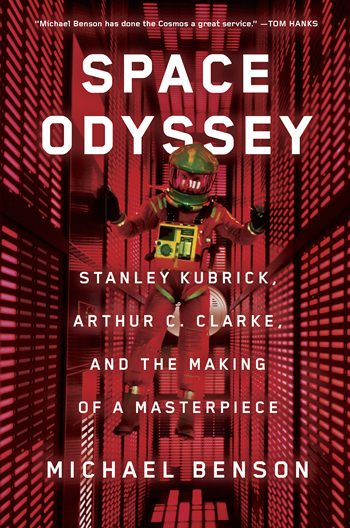
Fifty years ago, moviegoers had their minds blown by director Stanley Kubrick’s “2001: A Space Odyssey.” To this day some of them still aren’t quite sure what it all means.
Was an alien intelligence behind the monolith? What went wrong with the computer known as HAL? Does the way station in the afterlife really look like a Louis XIV hotel suite? Did Dr. Floyd’s daughter get her bush baby?
Seriously, part of Kubrick’s genius — and that of his co-screenwriter, Arthur C. Clarke — was not to spell out everything, thus challenging people to ponder the futuristic mythology unspooling before them. “If anyone understands it on the first viewing,” Clarke said at the time, “we’ve failed in our intention.”
Failure? Not when many consider “2001” the greatest science-fiction movie ever made and one of the landmarks of cinema, period.
Whether you’ve not seen “2001” recently or not seen it at all, do so before tackling Michael Benson’s exhaustive account of its creation. “Space Odyssey: Stanley Kubrick, Arthur C. Clarke, and the Making of a Masterpiece” is a movie wonk’s dream, launching its rich narrative with the written invitation from Kubrick to Clarke in 1964 to create what Kubrick hoped would be the first “really good” science-fiction film. Scores of books and videos about “2001” and its director have appeared over the half-century since its premiere, yet it would be difficult to envision anything offering the abundance of telling anecdotes, technical detail and keen insight that fills Benson’s “Space Odyssey.”
The author explains in great detail the narrative hurdles Kubrick and Clarke faced as they tried to stay true to what might be possible in space exploration three-plus decades in the future. For example, they didn’t settle on astronaut Dave Bowman’s helmetless jump from spacecraft to spacecraft without assurances that a human being could actually survive several seconds in a deep-space vacuum.
While Benson gives Clarke, the movie’s cast and various members of the production team their well-deserved places in the creation of “2001,” the maddeningly brilliant, obsessed Kubrick remains its star. He is presented as a flawed genius, at least in the eyes of his collaborators, a man at times cold and cruel and at other moments empathetic and generous. Kubrick cultivated creative people, encouraged them and gave them room to come up with ideas, yet he was exceedingly stingy when it came to sharing credit.
Kubrick, who died in 1999 and never saw the actual year 2001, remains as enigmatic as his movie monolith, a cinematic touchstone for future generations of filmmakers. (AP)
 |
 |





